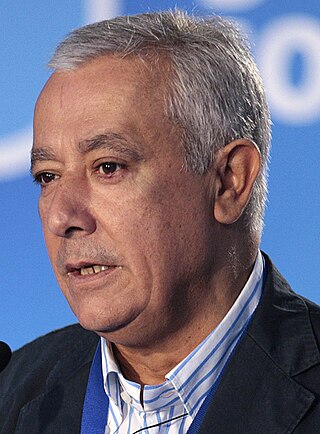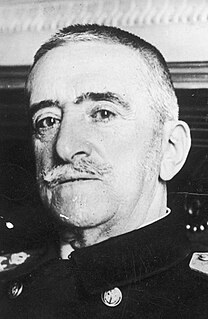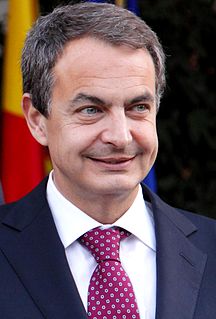
José María Alfredo Aznar López is a Spanish politician who served as the Prime Minister of Spain from 1996 to 2004. He led the People's Party (PP), the dominant right-of-centre party in the country at the time.

The People's Party is a conservative, liberal-conservative, Christian-democratic political party in Spain.
Spanish naming customs are historical traditions for naming children practised in Spain. According to these customs, a person's name consists of a given name followed by two family names (surnames). Historically, the first surname was the father's first surname, and the second the mother's first surname. In recent years, the order of the surnames in a family is decided when registering the first child, but the traditional order is still largely the choice. Often, the practice is to use one given name and the first surname only most of the time, the complete name being typically reserved for legal, formal, and documentary matters; however, both surnames are sometimes systematically used when the first surname is very common so as to get a more customized name. In these cases, it is even common to use only the second surname, as in "Lorca", "Picasso" or "Zapatero". This does not affect alphabetization: discussions of "Lorca", the Spanish poet, must be alphabetized in an index under "García Lorca", never "Lorca".

Ana Botella Serrano is a Spanish politician belonging to the People's Party and the first female Mayor of Madrid, from December 2011 to June 2015.
José Antonio Martínez Soler is the founder of 20 minutos, Spain's daily newspaper based in Madrid with 14 editions in major cities. José was Nieman fellow at Harvard university in 1976-1977.

Javier Arenas Bocanegra is a Spanish politician. Although born in Seville, he was raised in Olvera, hometown of his parents. He is married with two children, graduated in law and has an MA in Business Management.

Admiral Juan Bautista Aznar-Cabañas was the Prime Minister of Spain from the resignation of Dámaso Berenguer y Fusté on to the deposition of King Alfonso XIII and the proclamation of the Spanish Second Republic on April 14, 1931.

Celia Villalobos Talero is a Spanish politician.

Eduardo Serra Rexach is a Spanish politician and businessman, who served as the Minister of Defence from 1996 to 2000 during the government of José María Aznar. He is the only person to have held public office with all three governing parties in democratic Spain, having served in senior roles in the UCD, the Spanish Socialist Workers' Party, and the Partido Popular.

Moldovan-Spanish relations are foreign relations between Spain and Moldova. On 30 January 1992 Spain established diplomatic relations with Moldova. As of 2009 Spain does not have an embassy in Chişinău. Spain is represented in Moldova via its embassy in Bucharest in Romania.

The Autovía A-80, also known as Autovía del Suroccidente, a proposed highway in Asturias, Spain.

José María Michavila Núñez is a Spanish politician who belongs to the governing People's Party (PP).

José Luis Rodríguez Zapatero is a Spanish politician and member of the Spanish Socialist Workers' Party (PSOE). He was the Prime Minister of Spain being elected for two terms, in the 2004 and 2008 general elections. On 2 April 2011 he announced he would not stand for re-election in the 2011 general election and left office on 21 December 2011.

Holy See–Spain relations are foreign relations between the Holy See and Spain. Both countries established diplomatic relations in 1480. This is the oldest permanent diplomatic mission in history. The Holy See has a nunciature in Madrid. Spain has an embassy in Rome.
The Friends of Israel Initiative (FOII) is an international effort, to "seek to counter the attempts to delegitimize the State of Israel and its right to live in peace within safe and defensible borders", initiated and led by former Prime Minister of Spain and People's Party leader José María Aznar in 2010.
Events in the year 2001 in Spain.
The following lists events that happened during 2000 in Spain.

South Korea–Spain relations are the bilateral and diplomatic relations between these two countries. Spain has an embassy in Seoul. South Korea has an embassy in Madrid and a consulate general in Las Palmas de Gran Canaria. Relationships are good and friendly.

José María Aznar formed the Aznar I Government on 6 May 1996 after being nominated by King Juan Carlos I to form a government as a result of the People's Party (PP)'s victory at the 1996 general election. It was the government of Spain from 6 May 1996 to 28 April 2000, a total of 1,453 days, or 3 years, 11 months and 22 days. Aznar was elected Prime Minister by the Congress of Deputies on 4 May and was sworn into office on 5 May. Aznar's first cabinet was composed mainly by members of the PP, as well as a number of independents. It succeeded the fourth González government.

José María Aznar formed the Aznar II Government on 28 April 2000 after being nominated by King Juan Carlos I to form a government for a second term in office as a result of the People's Party (PP)'s victory at the 2000 general election. It was the government of Spain from 28 April 2000 to 18 April 2004, a total of 1,451 days, or 3 years, 11 months and 21 days. Aznar was elected Prime Minister by the Congress of Deputies on 26 April and was sworn into office on the same day. Aznar's second cabinet was composed mainly by members of the PP, as well as a number of independents. It succeeded the first Aznar government.













